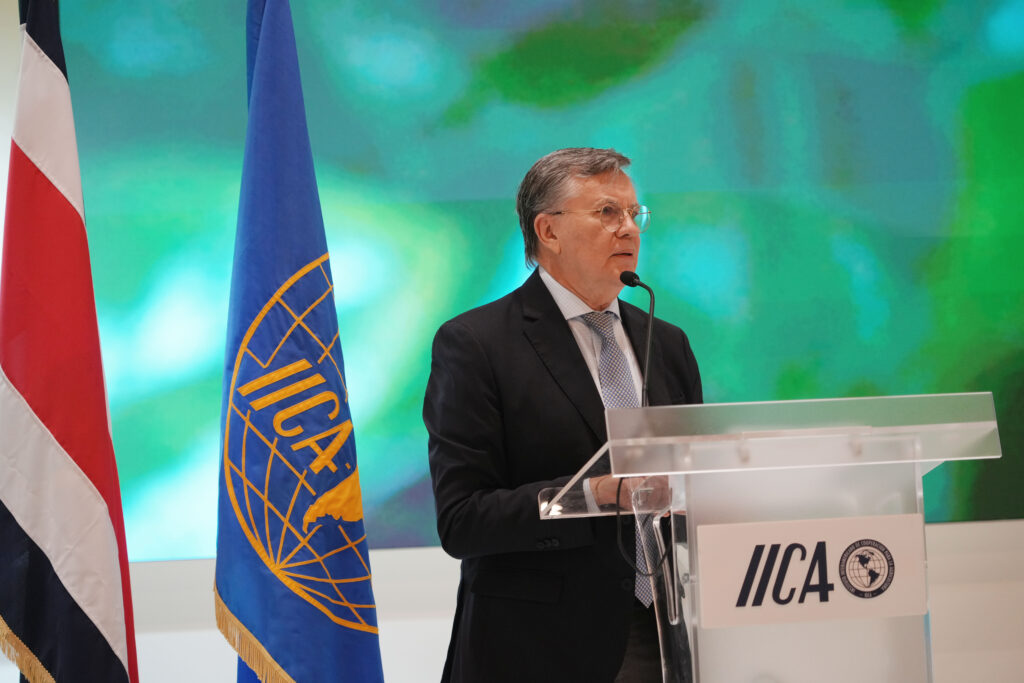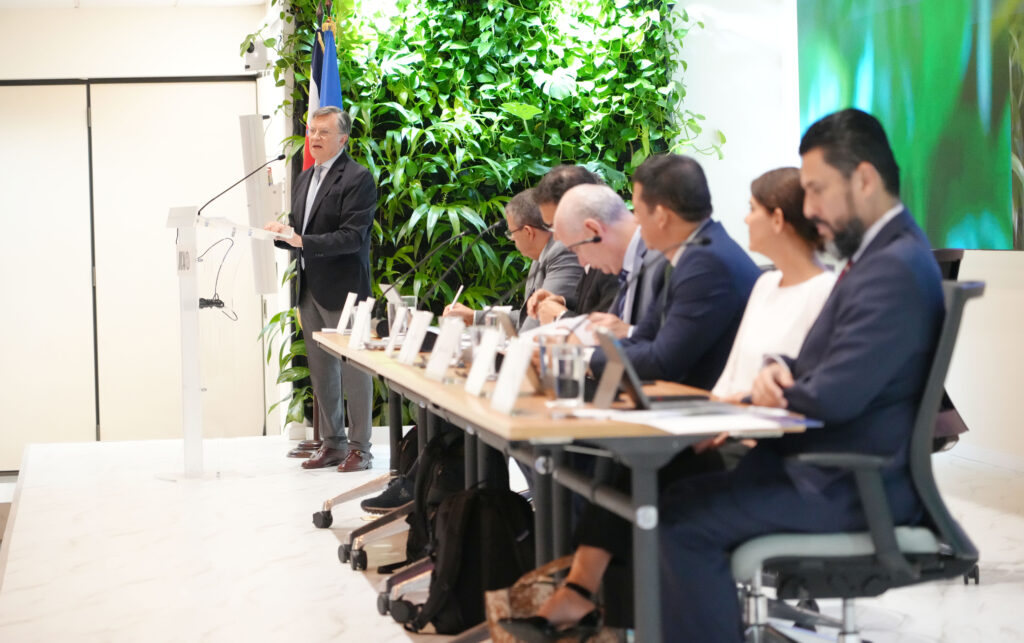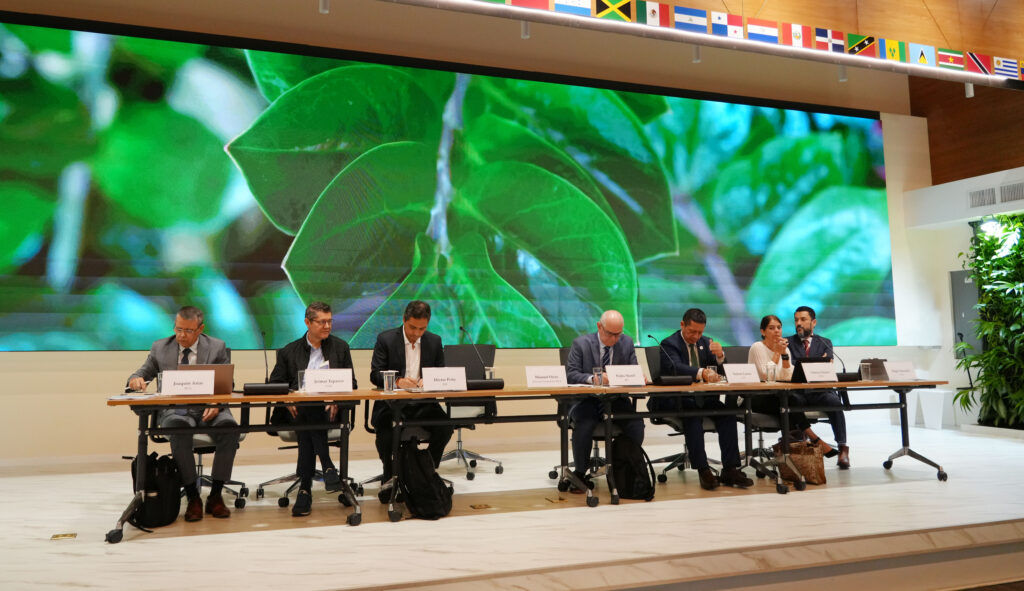
Manuel Otero, IICA Director General.
San Jose, 9 October 2025 (IICA) – Various experts from international organizations attending a meeting at the Headquarters of the Inter-American Institute for Cooperation on Agriculture (IICA) agreed that the challenging global environment of geopolitical changes, extreme weather phenomena and ecological transformations calls for the development of a new generation of public policies for agrifood systems.
During the opening of the Hemispheric Dialogue—a series of discussions and regional exchange sessions taking place over two days—participants shared transformative experiences stemming from the implementation of agrifood public policies in the Americas, that are producing results and that are scalable.
Participants in the event include senior authorities—directors, officials and officers responsible for the development, implementation and evaluation of policies in the hemisphere—from the Alliance of Bioversity International and CIAT, the World Bank, the Inter-American Development Bank (IDB), CAF-Development Bank of Latin America and the Caribbean, the Economic Commission for Latin America and the Caribbean (ECLAC), the International Food Policy Research Institute (IFPRI), the Organization for Economic Co-operation and Development (OECD) and IICA. Also in attendance are members of the private sector and academia.
Participants emphasized the importance of referring to science throughout the process of developing new public policies and indicated that the new frontier of technology today not only enables us to produce more, but also to be more sustainable and inclusive. They also spoke of the challenge posed by the weakening multilateral trade system, even as they highlighted the opportunities offered by the international green financing system, created by various environmental treaties.

Otero spoke about the region’s leadership in global food security, given that it supplies one in every three tons of food exported in the world.
The opening day of the event also featured the presentation of the inter-institutional publication, “Transition Towards a New Generation of Public Policies for Agrifood Systems” – the product of two years of collective work on this topic.
Looking to the future
The IICA Director General, Manuel Otero, offered some opening remarks and emphasized that the Hemispheric Dialogue reflected the fact that IICA is a forward-thinking institution. “We are a resilient institution. We have weathered many crises that have made us stronger. This week IICA celebrates 83 years, and we are already charting the course to our centenary, which will be in 2042”, he said.
Otero spoke about the region’s leadership in global food security, given that it supplies one in every three tons of food exported in the world.
“Any analysis of the outlook for global food security makesmention of the Americas, particularly Latin America and the Caribbean. We are key players today and will become more so in the future, but we must devise the roadmap. It will call on us to develop a new narrative that provides a true picture of the sector as part of the solution – a new generation of policies and new leadership. IICA is focusing on all of this”, he explained.
Hugo Chavarría, Manager of IICA’s Innovation and Bioeconomy Program, was the moderator of the first session, which discussed the need for and purpose of a new generation of public policies. He noted that today, the agrifood sector is being asked to pursue various objectives: “Before, we were demanding only greater productivity from the sector. Today, we are also seeking sustainability and inclusion, using different approaches that have complicated the scenario. In any case, there are numerous experiences in our region that prove that we can achieve this”, he stressed.
In summarizing the salient points of the publication , “Transition Towards a New Generation of Public Policies for Agrifood Systems”, Joaquín Arias, a specialist from the Institute (who is also the Coordinator of IICA’s Public Policy Observatory for Agrifood Systems, OPSAa), stressed that currently 295 million people in 53 countries of the world are experiencing severe food insecurity, and 19.7 million of them are in Latin America and the Caribbean.
Among other issues, the publication focuses on the need to transition from generalized subsidies, which end up being perverse incentives, to payments dependent on performance and measurable results. It also touched on the importance of making structural changes in governance to move towards a multisectoral and multi-actor system.
World Bank economist, Héctor Peña, referred to the need for greater investment in public goods and services. “In the last twenty years, it has fallen from approximately 2.6% to 1.6% of the agricultural gross domestic product (GDP). By comparison, in the OECD it is about 6.1%”, said Peña, while also stressing that, “It is no longer sustainable for public policies to be designed with no discussion between the public and private sectors”.
Valeria Piñeiro, from IFPRI, pointed out that, “Today they tell us we must produce more with less”, but fail to stress the fact that we must produce better. She felt that innovation must be incorporated on three complementary fronts: the political, technological and the institutional.
“We must also discuss how we can advance collectively in developing a coherent narrative for the sector, among different stakeholders, with a view to linking evidence with practice and translating it into reality”, she added.
Nelson Larrea, from CAF, explained that his financial institution was positioning itself as the green bank of Latin America and the Caribbean. “We set ourselves the goal that by 2026, at least 40% of our portfolio would contain very clear elements of sustainability. We also have an agricultural sustainability strategy with a defined target to provide 8.5 billion dollars in financing to the sector by 2030”.

Joaquín Arias, Coordinator of IICA’s Public Policy Observatory for Agrifood Systems; Jeimar Tapasco, Researcher from the Alliance of Bioversity International and CIAT; Héctor Peña, Economist Specializing in Agrifood Policies at the World Bank; Pedro Martel, Division Chief of Agriculture and Rural Development at the IDB; Nelson Larrea, Principal Executive on Leadership in Agricultural Sustainability at CAF; Valeria Piñeiro, Senior Economist at IFPRI; and Hugo Chavarría, Manager of IICA’s Innovation and Bioeconomy Program.
Jeimar Tapasco, from the Alliance of Bioversity International and CIAT, spoke about scientists and their role, which is to inform public policy makers. He maintained that, “Science often take sides when it comes to certain issues, which it shouldn’t”. When we analyze the data, if the results do not coincide with previous theories, we must change the theories, not the data”.
Martín Piñeiro, Director General Emeritus of IICA, was also present. He argued that drastic geopolitical changes are afoot, and it is quite difficult to predict their outcome. “One of the most important aspects for the agrifood sector is the weakening of the multilateral system, in general, and the World Trade Organization (WTO), in particular”, he said. “This has prompted a resurgence of bilateral and multilateral agreements to regulate international trade, which will require extremely active trade diplomacy”.
More information:
Institutional Communication Division.
comunicacion.institucional@iica.int











